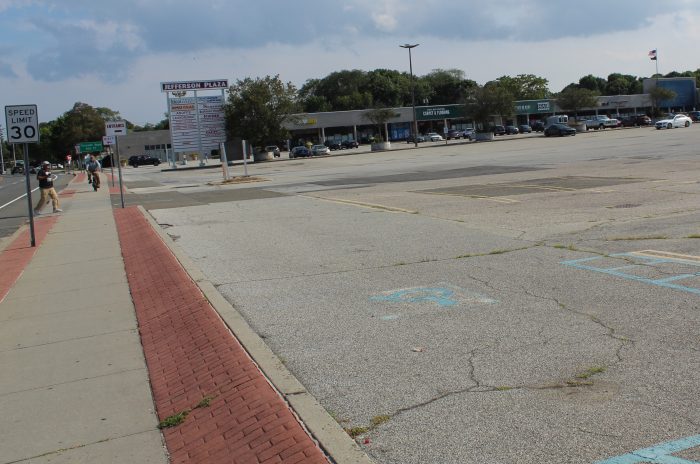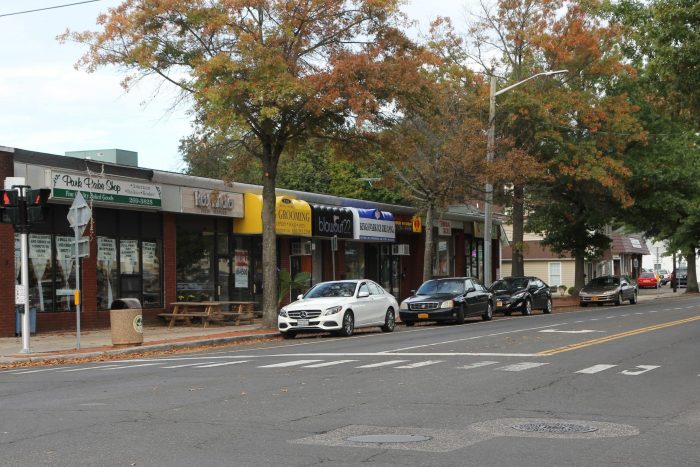Port Jefferson Station/Terryville is approaching a potentially community-defining transformation as the Brookhaven Town Board weighs the future redevelopment of the Jefferson Plaza shopping center, owned by Islandia-based Staller Associates.
Later this month, the board will consider rezoning the 10-acre parcel at the intersection of state Route 112 and Terryville Road to a Commercial Redevelopment District, or CRD, a new classification within the town’s Zoning Code. Jefferson Plaza would be the first property in town history to receive this designation if approved.
Enacted in 2020, the CRD enables mixed-use development along parcels of over 5 acres in size. According to the code, the CRD aims “to create the type of planning and zoning flexibility which is necessary to stimulate the revitalization of abandoned, vacant or underutilized commercial shopping center, bowling alley and health club properties.”
Town of Brookhaven Councilmember Jonathan Kornreich (D-Stony Brook) represents Port Jefferson Station on the Town Board. In an exclusive interview, he summarized the CRD’s purpose as “more housing, less commercial space, generally.”
“The local government has created an incentive to spur redevelopment,“ he said. “But it hasn’t been used yet, so we’re trying to use it now.”
Commercial decline
Kornreich said this new approach to commercial revitalization is guided by a sequence of “extinction events” occurring within the local retail market.
Since the establishment of these local downtowns in the previous century and even earlier, Kornreich identified the emergence of automobile culture and the growth of large box stores as the first threat to traditional mom-and-pop storefronts and downtown economies. In the wake of this first extinction event, “retail took a hit that it never really recovered from,” Kornreich said.
Retail’s downward trajectory was further exacerbated by e-commerce, which began to put even the big box stores and large retailers out of business. “And then, of course, COVID came, and that hit commercial real estate and retail,” the councilmember noted.
Confronting the many changes reshaping the commercial landscape, Kornreich said the CRD would help spur commercial redevelopment.
“This is our existential challenge: How do we help guide the redevelopment of our community so it can be healthy, so that it can thrive, and so that people can afford to live here and have a good quality of life,” he said.
Richard Murdocco is an adjunct professor in the Department of Political Science at Stony Brook University, specializing in land use, real estate markets, economic development and environmental policy. Given the current pressures upon the commercial sector, Murdocco concluded that “these antiquated shopping centers need a redo.”
While redevelopment has traditionally elicited local opposition from nearby residents, Murdocco suggests that various projects throughout the region have gained traction among locals.
“It seems to me that a lot of these redevelopment projects are starting to gain momentum because the property and the blight are so large,” he said. “These are significant pieces of property,” adding, “Government responded to the need for adaptive reuse, and now there’s a legal mechanism through the zoning district on which to do that.”
Questions raised
The push for commercial redevelopment has met with scrutiny from some.
Ira Costell, president of the Port Jefferson Station/Terryville Civic Association, raised several questions about the Jefferson Plaza proposal.
The CRD “hasn’t been used previously, and this does seem to be the test case,” he said. “In my estimation, it’s the lynchpin for further development in our community, so that’s why it’s essential that we get this right and not rush to judgment.”
“To address those things, I think we need better community input,” he added. To generate such input, he has asked residents to attend the civic’s upcoming meeting at Comsewogue Public Library on Tuesday, Nov. 28, at 7 p.m.
Local civic members are ringing the alarm over the CRD in the neighboring Three Village community. Herb Mones, land use chair of the Three Village Civic Association, highlighted the need to remediate commercial blight but suggested the CRD code is too developer-centric.
“On every level, the intention of redeveloping neglected or failing shopping centers is an admirable goal,” he said. “But the way that the code is written allows for really unprecedented development that has a tremendous negative effect on communities that are impacted by the density that results.”
Mones said the language of the CRD code is “so vague, so arbitrary and so capricious that it could be applied to virtually any shopping center in the Town of Brookhaven.”
Based on the statute, which incentivizes redevelopment of blighted properties through relaxed land use standards, Mones said the CRD code “encourages landowners to purposely neglect their properties in order to promote this eventual redevelopment.”
George Hoffman, also a member of TVCA, concurred with Mones, referring to the CRD code as “a very vague law that I think was done in haste.”
“It was really a code change that was done when we didn’t know what was going to happen with COVID,” Hoffman said. “I think it really has to be reevaluated, and I don’t think it works in this situation here” at Jefferson Plaza.
Given that Jefferson Plaza would be the first parcel listed as a CRD, he added that this matter has implications for residents townwide.
“If they use this code to the maximum allowable density, I think it’s going to set the standard of a new suburban model for development,” he said.
The Town Board will consider the proposed change of zone for the Jefferson Plaza property on Thursday, Nov. 30, at 5 p.m.






